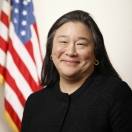
This past March, President Obama and first lady Michelle Obama hosted a White House Forum on Workplace Flexibility. The Forum focused the national spotlight on workplace flexibility, its ability to improve lives, support business and strengthen the economy.
That important conversation continued this week as the Alfred P. Sloan Foundation hosted the Focus on Workplace Flexibility national conference, which I attended. The conference looked more closely at the demographic and economic changes transforming work and family, as well as effective business practices and practical public policy solutions to support workplace flexibility.
Valerie Jarrett, Senior Advisor to the President and Chair of the White House Council on Women and Girls, attended the opening reception and dinner at the Corcoran Gallery of Art. Valerie participated on a panel with Admiral Mullen, Chairman of the Joint Chiefs of Staff, and Ted Childs, Jr., Retired Vice President, Global Workforce Diversity, that was moderated by Claire Shipman, author of Womenomics and senior correspondent for ABC’s Good Morning America. During the panel discussion, Valerie spoke about the need for the federal government to lead by example. Due to its size and complexity, Valerie said, the federal government must be flexible and creative in bringing about a comprehensive and sustainable workplace flexibility program for itself and for others. She also reminded us of the President’s pledge to support an improvement in flexibility for federal employees because it increases productivity.
Echoing Valerie’s words, Admiral Mullen said that recognizing and finding ways to accommodate the changing needs of service members and their families with regard to the military workplace should be a priority for leaders. "The ability to be the best we can be and carry out our missions is so central to our focus on our people, ... but more than our people, our families," Admiral Mullen said. "And while we've made significant strides, we still have a long way to go." Allowing flexible options that affect the number of hours worked and the places where employees work is one way leaders can help in providing balance between work and family life, Admiral Mullen said. He cited flex time and compressed work weeks, part-time work, job sharing and teleworking as examples.
The following day at Georgetown University Law Center, I had the honor to offer the conference’s closing remarks. I took this chance to reiterate the notion that workplace flexibility is not just a “women’s issue,” but rather an issue that affects the well-being of our families, the success of our businesses, and the future of our nation’s economy. We must change our workplaces to meet the demands of a changing working environment as workplace flexibility is not a luxury, but a competitive imperative. Consequently, greater research in the area of workplace flexibility to overcome the hesitation to its benefits is a must.
In order to change mindsets and ultimately shift the paradigm for working families and our economy, we need to extend and expand the dialogue and to convert those that doubt the benefits of workplace flexibility. If you or someone you know is interested in designing and executing events that serve to raise awareness about the benefits of workplace flexibility, educate key stakeholders and encourage workplace policy changes, then check-out our work-flex event starter kit here.
Tina Tchen is Director of the White House Office of Public Engagement and Executive Director of the Council on Women and Girls


